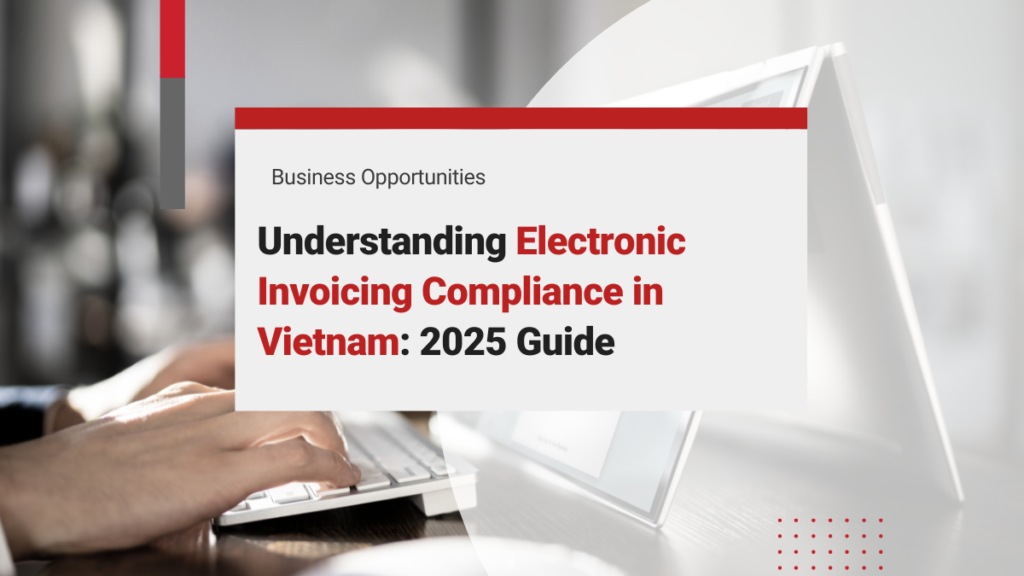Are you looking to understand electronic invoicing compliance in Vietnam? This guide will help you grasp the key compliance requirements, from registration to invoice formatting, digital signatures, and reporting obligations, ensuring you stay compliant with the latest regulations.
Overview of Electronic Invoicing Compliance in Vietnam
Since July 2022, electronic invoicing has become a mandatory practice for all businesses in Vietnam. This shift marks a significant advancement in the country’s digital transformation efforts. The implementation of electronic invoices aims to enhance VAT compliance, reduce fraud, and increase tax revenue. The requirement to issue electronic invoices applies universally to all companies and individuals providing goods or services across all cities and provinces.
The move to mandatory electronic invoicing underscores the Vietnamese government’s commitment to modernizing its tax infrastructure. Mandating electronic invoices, digital transaction reporting to the General Department of Taxation (GDT), and GDT website registration aims to foster transparency and efficiency in the tax system.
This initiative combats VAT fraud and simplifies tax reporting, easing compliance for businesses.
Read More: Guide to Value Added Tax (VAT) in Vietnam for 2025
E-Invoicing Implementation Timeline
The journey towards mandatory electronic invoicing in Vietnam officially began in 2021 when the Ministry of Finance announced the e-invoicing in Vietnam project. The implementation was rolled out in two distinct phases. The first phase, which started in November 2021, included pilot programs in key provinces and cities such as Hanoi, Ho Chi Minh City, Hai Phong, Quang Ninh, Phu Tho, and Binh Dinh.
Following the success of these pilot programs, the second phase involved the nationwide rollout of the e-invoicing model by July 2022. This phased approach allowed the authorities to address any initial challenges and ensure a smooth transition for businesses across the country. The gradual implementation helped businesses adapt to the new system and comply with the new e-invoicing regulations.
Transition from Paper to Electronic Invoices
The transition from paper invoices to electronic invoices marked a significant change for businesses in Vietnam. As of July 2022, businesses were required to stop using previously accepted invoice formats, such as self-printed invoices, pre-printed invoices, and invoices purchased from the tax authority. This move aimed to streamline invoicing processes and reduce the administrative burden associated with paper invoices.
The mandatory shift to electronic invoicing required businesses to adapt to a system offering greater accuracy and efficiency in tax reporting. The electronic data interchange (EDI) system enables real-time transmission of invoice data to tax authorities, reducing the risk of errors and fraud.
This transition simplifies the invoicing process and aligns Vietnam with global e-invoicing standards.
Key Requirements for E-Invoicing Compliance
Compliance with electronic invoicing regulations requires businesses to adhere to specific requirements set by authorities. One of the primary prerequisites is the registration and approval process through the General Department of Taxation (GDT). This involves submitting necessary documents and gaining approval before issuing electronic invoices.
Additionally, businesses must ensure that their electronic invoices meet the prescribed format and security standards. Compliance with these requirements is crucial for avoiding legal issues and ensuring smooth operations.
Choosing an e-invoicing provider that aligns with local regulations is crucial for maintaining compliance.
Registration and Approval Process
The registration and approval process for electronic invoicing in Vietnam involves several steps. Businesses must submit a decision on the application, an application form, and an e-invoice template to the General Department of Taxation (GDT). Upon receiving the application, the tax authorities provide an electronic notice of approval or refusal within one working day.
Vietnamese businesses must register on the GDT website and obtain approval before issuing e-invoices. This process ensures that businesses are compliant with the new e-invoicing legislation and can legally issue electronic invoices. The GDT oversees the mandatory submission of e-invoice data and provides the necessary approvals.
Valid Invoice Format
In Vietnam, the valid format for electronic invoices is XML. This format is mandated by the tax authorities and ensures standardization across all electronic invoices. Businesses must extract and transmit e-invoice data in XML format to comply with local regulations.
B2B electronic invoicing requires strict adherence to the XML format standards for data submission. The accurate transmission of electronic invoice data is vital for complying with e-invoicing requirements set by tax authorities. This standardization helps reduce VAT fraud and improves the overall efficiency of tax reporting processes.
Digital Signatures and Security
Digital signatures play a crucial role in ensuring the authenticity and integrity of electronic invoices in Vietnam. These signatures are mandatory for B2B electronic invoices, providing a layer of security that guarantees the invoice has not been tampered with.
The use of digital signatures aligns with the broader goals of the digital age, enhancing security and trust in electronic transactions. Robust security measures protect electronic invoices from unauthorized access and ensure compliance with e-invoicing regulations.
Reporting and Archiving Obligations
Reporting and archiving obligations are critical components of e-invoicing compliance in Vietnam. Businesses must ensure that electronic invoices are securely stored for ten years to comply with regulatory requirements. This long-term storage is essential for maintaining accurate records and facilitating audits.
Moreover, businesses must transmit electronic invoice data to tax authorities, either directly or through authorized service providers, while receiving electronic invoices. This requirement supports real-time monitoring of transactions, helping tax authorities detect and prevent fraud.
Meeting these obligations ensures compliance with tax regulations and helps avoid potential penalties.
Data Transmission to Tax Authorities
Businesses in Vietnam are required to submit electronic invoice data to tax authorities to ensure compliance with e-invoicing regulations. This data transmission can be done directly or through authorized service providers, facilitating real-time monitoring of transactions and supporting tax authorities in detecting fraud.
The General Department of Taxation oversees e-invoice data submission, ensuring businesses adhere to prescribed reporting standards. This process helps maintain transparency and accountability in the tax system, ultimately contributing to improved tax compliance and reduced fraud.
Secure Storage of E-Invoices
In Vietnam, there is a requirement for the secure storage of electronic invoices. These invoices must be kept for ten years. This requirement ensures that businesses maintain accurate records for audit purposes and comply with regulatory obligations. Secure storage measures must include protection against unauthorized access and data loss to ensure the integrity of stored invoices.
Adhering to storage requirements safeguards electronic invoices and ensures compliance with e-invoicing regulations. Maintaining secure and accessible records is crucial for facilitating audits and resolving any potential disputes with tax authorities.
Read More: Benefits of Outsourcing Bookkeeping in Vietnam: Importance, Common Mistakes, and Best Practices
Specifics of B2B and B2C Electronic Invoicing
Electronic invoicing in Vietnam encompasses B2B and B2C transactions, each with specific requirements. Electronic invoices can either include verification codes or lack them. B2B electronic invoicing includes invoices with a GDT identification code and invoices without a GDT identification code, ensuring compliance with local regulations.
For B2C transactions, electronic invoicing is permissible for various business types, including supermarkets and restaurants. This flexibility facilitates easier transactions at points of sale, although mandatory e-invoicing is not obligatory for all business types.
The regulations aim to increase competitiveness and combat tax fraud, impacting B2C transactions.
B2B E-Invoicing Requirements
B2B electronic invoicing in Vietnam requires businesses to comply with specific technical and legislative standards. These regulations ensure businesses issue electronic invoices that meet prescribed format and security requirements.
B2C E-Invoicing at Points of Sale
B2C electronic invoicing is permitted for various businesses, facilitating easier transactions at points of sale. Specific business types, such as supermarkets and restaurants, can issue electronic invoices, although it is not mandatory for all. The draft decree clarifies applicable cases and required content, including the addition of QR codes for buyers to search invoices.
Recent Regulatory Updates and Draft Decrees
Recent amendments to Decree No. 123/2020/ND-CP have introduced significant changes to e-invoicing regulations in Vietnam. These regulatory updates aim to enhance compliance and streamline processes for businesses, particularly those engaged in international trade. The latest draft decree outlines changes to VAT and sales invoices specifically for Export Processing Enterprises (EPEs).
Under the new draft decree, electronic commercial invoices will be mandated for all exported goods and services. These proposed changes are designed to improve VAT handling and simplify sales invoice procedures for businesses involved in cross-border transactions. The updates reflect Vietnam’s commitment to aligning with global e-invoicing standards and enhancing tax compliance.
Third Draft Decree Amendments
The third draft decree amendments to Decree No. 123/2020/ND-CP introduce key changes specifically targeting Export Processing Enterprises (EPEs). These amendments mandate that EPEs register their electronic invoicing systems with tax authorities, ensuring that their invoicing practices are in line with the new regulations. Furthermore, EPEs with business activities subject to VAT must utilize VAT invoices or sales invoices, enhancing the transparency and accuracy of their tax reporting.
These regulatory updates are part of a broader effort to enhance e-invoicing practices and compliance in Vietnam. By focusing on the specific needs and challenges faced by EPEs, the new decree aims to streamline processes and reduce administrative burdens, ultimately fostering a more efficient and compliant business environment.
Key E-Invoice Updates Under Vietnam’s Decree 70/2025/ND-CP
Effective June 1, 2025, Vietnam’s e-invoice regulations have been updated under Decree 70/2025 and Circular 32/2025. Key changes include mandatory real-time e-invoicing for high-revenue businesses and foreign e-commerce suppliers, stricter issuance timelines, and simplified correction procedures. Circular 32 further clarifies e-invoice authorization, contract requirements with service providers, and new rules for POS-generated invoices, high-volume transactions, and financial leasing. These updates aim to enhance transparency, digital compliance, and coverage across more business sectors.
Read More: Essential Guide: Key E-Invoice Updates Under Vietnam’s Decree 70/2025/ND-CP
E-Invoices for Exported Goods/Services
The latest draft amendments to Decree No. 123/2020/ND-CP propose significant changes to the handling of electronic invoices for exported goods and services. These amendments include provisions for better VAT handling and sales invoice procedures, specifically tailored for Export Processing Enterprises (EPEs). By mandating the use of electronic commercial invoices for all exported goods and services, the decree aims to simplify customs procedures and enhance tax compliance.
These proposed changes are designed to align Vietnam’s e-invoicing practices with international standards and improve the efficiency of cross-border transactions. This move not only benefits businesses engaged in international trade but also supports the government’s efforts to modernize the tax system and reduce VAT fraud.
Benefits of Complying with E-Invoicing Regulations
Complying with electronic invoicing regulations in Vietnam offers numerous benefits for businesses. The primary advantage is enhanced tax compliance, as the standardized e-invoicing system reduces the risk of VAT fraud and ensures accurate tax reporting. By adopting electronic invoicing, businesses can streamline their invoicing processes, reduce errors, and improve overall efficiency.
Moreover, compliance with e-invoicing regulations can lead to significant operational efficiency and cost savings. The automation of invoicing processes reduces administrative burdens, allowing staff to focus on more strategic tasks. Additionally, digital invoicing can enhance cash flow by minimizing payment delays through faster processing, ultimately benefiting the financial health of businesses.
Enhanced Tax Compliance
The main goal of establishing e-invoicing standards is to increase adoption and reduce VAT fraud in Vietnam. By capturing invoices in automation systems, e-invoicing improves accounts payable processes, leading to touchless processing and enhanced tax compliance. The draft regulations support e-invoice adoption for exported goods, simplifying customs procedures and boosting compliance.
E-invoicing enhances transparency and accountability in tax reporting, making it easier for businesses to comply with tax regulations. By reducing the risk of fraud and errors, e-invoicing contributes to a more efficient and reliable tax system, benefiting both businesses and tax authorities.
Operational Efficiency and Cost Savings
Following e-invoicing regulations can lead to substantial savings on operational costs for businesses. The draft decree permits electronic commercial invoices for exported goods and services, streamlining documentation for exporters. This simplification reduces administrative burdens and allows businesses to focus on core activities and issue electronic invoices.
Additionally, the automation of invoicing processes enhances operational efficiency by reducing the time and effort required for manual invoice processing. Businesses can benefit from faster invoice approval times, improved cash flow, and reduced payment delays, ultimately leading to a more efficient and cost-effective operation.
Looking for a Compliance Retainer for Your Company? InCorp Can help!
Choosing the Right E-Invoicing Solution Provider
Choosing the right e-invoicing solution provider is crucial for ensuring compliance and operational efficiency. E-invoicing providers must comply with specific requirements set by Vietnam’s tax authority, covering financial, legal, and technical aspects. A reliable provider should offer seamless integration with existing accounting and ERP systems, enhancing overall financial management.
Moreover, businesses should look for providers that offer robust financial stability, legal compliance, and secure connectivity with the General Department of Taxation. Multi-device access, data integrity, and confidentiality are also essential features to consider when choosing an e-invoicing solution provider.
Criteria for E-Invoicing Providers
When selecting an e-invoicing provider, businesses must consider several criteria to ensure compliance and reliability. Providers must demonstrate robust financial stability to ensure they can meet the demands of businesses. Legal compliance is also crucial, as providers must ensure their solutions align with Vietnamese tax regulations.
Additionally, e-invoicing service providers must offer secure connectivity with the General Department of Taxation at all times. Businesses should also look for providers that support multi-device access and maintain data integrity and confidentiality during exchanges. These features are essential for ensuring smooth and secure e-invoicing processes.
Leading E-Invoicing Solutions
EDICOM is a prominent e-invoicing provider in Vietnam, offering solutions that integrate seamlessly with company management systems for compliance. Their platform enables the automated transformation of data into the XML format required by the General Department of Taxation, ensuring compliance with local regulations. EDICOM’s cloud-based services provide accessibility and scalability for businesses, ensuring 99.9% system availability.
User-friendly interfaces are crucial for e-invoicing solutions, facilitating easier adoption by businesses. EDICOM and other leading providers offer intuitive platforms that simplify the e-invoicing process, helping businesses comply with regulations while improving operational efficiency.
Choosing a reliable provider ensures businesses meet all e-invoicing requirements and benefit from streamlined processes.
How InCorp Can Help?
Vietnam’s move to electronic invoicing means businesses must adjust to new rules to operate legally and efficiently. Shifting from paper to digital invoices, following key compliance steps, and staying updated on recent changes are vital for meeting tax requirements. Incorp Vietnam helps you understand the e-invoicing rules, choose the right solution, and ensure you comply with all regulations. With Incorp Vietnam, you can smoothly adopt e-invoicing and take advantage of its benefits. Connect with Incorp Vietnam to learn how we can support your e-invoicing implementation.

clients worldwide

professional staff

incorporated entities in 10 years

compliance transactions yearly
Learn the Right Setup for Business
Expansion in the Vietnam
Frequently Asked Questions
Is e-invoicing mandatory in Vietnam?
- E-invoicing is mandatory in Vietnam as of July 2022 for all companies and individuals providing goods or services across the country. Compliance is essential for conducting business in Vietnam.
What types of invoices are no longer valid in Vietnam since the implementation of e-invoicing?
- Since the implementation of e-invoicing in Vietnam, self-printed invoices, pre-printed invoices, and invoices purchased from the tax authority are no longer valid.
How long must electronic invoices be securely stored in Vietnam?
- Electronic invoices in Vietnam must be securely stored for 10 years.
What is the valid invoice format for e-invoicing in Vietnam?
- The valid invoice format for e-invoicing in Vietnam is XML, which must include both e-invoice data and digital signature data.






